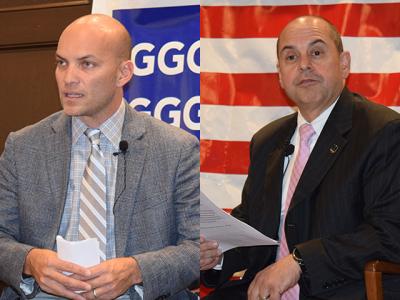The Debate That Lacked Debate

East Hampton Town Councilman David Lys and Manny Vilar, who is challenging him for a seat on the town board, were in broad agreement on a range of topics at a debate hosted by the East Hampton Group for Good Government on Tuesday at the East Hampton Library.
The evening echoed an Oct. 11 forum hosted by VoteHamptonNY in which Mr. Vilar, the Republican candidate, and Mr. Lys, who changed his party affiliation from Republican to Democratic before his January appointment to the town board, presented little in the way of contrasting views.
To a question about how they would respond to a mass resignation of town employees leaving for higher-paying jobs in neighboring municipalities, Mr. Vilar said that the problem has been building for years. A townwide class and compensation review by an outside entity is in order, he said. Some people could be in the wrong position, and “others could have fallen by the wayside because of the grade structure they’re in.” A rapid attrition rate “is indicative of other problems,” but employees from UpIsland who get experience in East Hampton and leave for high-paying jobs elsewhere clearly demonstrate that salaries are too low, he said.
Mr. Lys said that the town board would have to determine the reason for high attrition. A long commute or internal strife, and not simply compensation, could be culprits, he said. The town has regraded multiple positions, he said, adding $171,000 to the salaries of around 20 employees in the tentative 2019 budget. Merit pay might also be explored, he said. He referred to the town’s new Live Here, Work Here initiative, aimed at guiding residents through the application and exam processes. But given the state-mandated tax cap, “We just can’t dole money out without repercussions,” he said. “We have to be very careful, and get the best for what we’re allowed to do.”
The hot-potato issue of a property tax reassessment was handled gingerly. Both candidates acknowledged an unfair structure in which some south of the highway second-home owners are assessed less than residents of Springs, but worried about a reassessment’s impact on senior citizens and young families struggling to pay a mortgage.
Mr. Vilar predicted that the state would eventually mandate a reassessment. “I do believe this is coming, probably sooner rather than later, and we should have an understanding of where the wealth is locked up through years of non-assessments, an understanding of who’s impacted and how,” he said. “We really need to sit down, look at the problem, see where the numbers lie, to have a strong understanding of the implications this is going to have, not only on town government but how it’s going to impact the school districts.”
Both he and Mr. Lys live in Springs, he said. “Our taxes are astronomical in comparison to East Hampton. If it would add 3 percent to taxes outside of Springs, 3 percent of a few grand is a lot; 3 percent of $8,000 or $9,000 is a huge amount.”
Mr. Lys said that the town should hire an outside firm to conduct a reassessment, should it be mandated by the state, and through the State Legislature seek a phasing in of any resulting increase in taxes to soften the impact. He agreed that the town “should get ahead of it sooner rather than later.”
The candidates agreed that the Police Department’s guidelines with respect to the arrest and detention of undocumented immigrants are appropriate. The police do not honor detainer directives issued by the federal Immigration and Customs Enforcement or Customs Border Protection, holding arrestees only when a judicial warrant is in place, there is probable cause that someone has previously been convicted and removed from the country, or that a serious crime was involved.
“The policy is appropriate now,” Mr. Lys said. He supported immigration and a path to citizenship for immigrants.
Mr. Vilar said that during his 2017 campaign for supervisor he had advocated an office of immigrant affairs, and that the present policy “seems to be working okay throughout the state.”
Mr. Lys and Mr. Vilar disagreed — gently — about a time frame in which water contamination could be mitigated and safeguarded. Addressing wastewater treatment townwide could cost close to $1 billion, Mr. Vilar said. All options, including a federal revolving fund, should be explored, he added. “Maybe we can fund septic replacement over years,” he said. “But I don’t think this is a problem that can be fixed in a 20-year span. The money is an astronomical amount.”
“I disagree that we can’t get this done in 20 years,” Mr. Lys said. “We’ve got to be proactive.” He suggested a multifaceted approach including sewage treatment plants, encouragement and incentives for property owners to replace aging and failing septic systems, discouraging landscapers from using nitrogen-loading components in their products, and aquaculture, the seeding of waterways with filter-feeding shellfish.
Election Day is Nov. 6.
